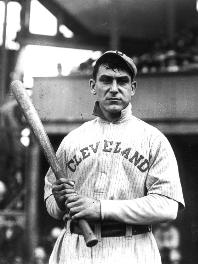|

|
| *Hall of Fame
Photo* |
Philadelphia Phillies 1896-1900
Philadelphia Athletics 1901-02, 15-16
Cleveland Indians 1902-14
There is no telling where the Cleveland Indians franchise would be today
if it were not for Napoleon Lajoie. Ironically, Lajoie might not have become a member of the Tribe had it not been for the
chicanery of AL President Ban Johnson who transferred the star infielder to the team to get around a legal injunction.
A
native of Woonsocket, RI, Napoleon Lajoie was born on September 5, 1874 to French immigrants. By age ten, he was working full
time in a textile mill and playing baseball in his free time. A natural athlete, he soon caught on with a local semi-pro team
and then, in 1896 he became property of the National League's Philadelphia Phillies.
It didn't take long for the 22-year-old
to adjust to the big league game, as he hit .326 with 42 RBI in 39 games. In 1897, he became a star, hitting .361 with 127
RBI and a league best .569 slugging percentage. He continued his stellar play the rest of the century hitting .324, .378,
and .337 from 1898-1900.
Following the 1900 season, the Phillies offered Lajoie the league maximum $2,400 per year,
but when he got word that Connie Mack of the cross-town Athletics would pay him $4,000 to jump to the newly formed American
League, Lajoie's days with the Phillies were over. (As an insurance policy that the new league would last, Lajoie would not
sign with the Athletics until the full amount of his contract was deposited into his bank account).
The Phillies meanwhile,
filed a lawsuit to prevent the loss of Lajoie and other star players. As the court proceeding drug on, Lajoie joined his new
team and posted one of the finest seasons in history. In 1901, the Rhode Island native won the AL Triple Crown (.426, 14 HR,
125 RBI) and led the new league in runs (145), hits (232), doubles (48), on-base-percentage (.463), and slugging percentage
(.643). Lajoie hit safely in 114 of his 131 games that season.
Finally in April 1902, the Pennsylvania Supreme Court
ruled that Lajoie had to return to the Phillies because baseball's reserve clause made him their property until he was traded
or released. The ruling lacked teeth however, because the court only held jurisdiction over Pennsylvania. AL President Ban
Johnson simply arranged for Lajoie to be transferred to the struggling Cleveland franchise.
Because Lajoie was considered
a fugitive in Pennsylvania, he could not accompany his teammates when they played the Athletics. Sheriff's deputies would
even search Clevelands train when they arrived in Philadelphia. Fortunately by 1903, the leagues ironed out their differences
and Lajoie was allowed to play in the "City of Brotherly Love" once again.
After joining the Indians in 1902, Lajoie
quickly became the face of the franchise. He won three straight batting titles (1902-04) and was named player/manger in 1905,
at which time the team decided to change it's name from the Blues to the Naps in honor of their best player. While Lajoie
compiled a .546 winning percentage as a manger, he resigned following the 1909 season because he felt the dual responsibilities
were adversely affecting his play.
Late in the 1910 season, the Indian's stalwart found himself in the midst of controversy
once again. Lajoie, who was popular with players around the league, was in a hotly contested race for the batting title with
Detroit's Ty Cobb, easily the most hated man in the game. The winner would receive a Chalmers automobile.
On the last
day of the season, in a doubleheader at St. Louis, Lajoie bunted for seven infield hits and smacked a triple, raising his
average to .384. Cobb meanwhile, sat out the final two games to preserve his average and finished with a .385 mark. Because
the race was so close, the Chalmers Automobile Company decided to award each man a new car.
Later that winter, it
was revealed the St. Louis manager Jack O'Connor instructed his third baseman, Red Corriden, to play deep in order to enable
Lajoie to pick up the bunt singles and hopefully beat out Cobb for the title. AL President Ban Johnson investigated the incident
and cleared all involved of any wrongdoing. O'Connor, however, was later fired.
(In 1981, over 70 years later, the
Sporting News discovered that Cobb's mark of .385 had been artificially inflated because a game in which he had went 2 for
3 was accidentally counted twice. Despite the finding, the commissioner's office decided not to change history and Cobb remained
listed as the 1910 AL batting champ.)
Lajoie continued to play at a high level the next three seasons, hitting .365,
.368, and .335 from 1911-13. Following the 1914 season in which he picked up his 3,000th hit, but batted just .258, Lajoie
was shipped back to Philadelphia. It was at that time, that Cleveland changed its name from the Naps to the Indians.
Now
40, with his best days behind him, Lajoie finished his career with the Athletics with two mediocre seasons. He retired with
a .338 average, 3, 242 hits, and a .380 on-base-percentage. He was inducted in to the Hall of Fame in 1937. Napoleon Lajoie
died on February 7, 1959 in Dayton Beach, FL at the age of 84.
-David Zingler, April 2004
Simply Baseball Notebook
DISCLAIMER: All pictures are assumed to be in the public domain.
No violation of copyright is intended here. If one of the photos above is not in the public domain, please notify us and it
will be removed.
|

